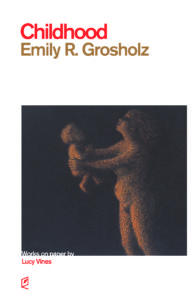Poet Emily Grosholz answers a few questions about Childhood (Accents Publishing, 2014)

Tell us the story of your Accents Publishing book.
I wanted to create a book with my poems about small children (my four children when they were small) to support UNICEF. I’ve been a supporter of UNICEF for thirty years, since my first child was born. I had a friend in Paris, Lucy Vines, who drew lovely pictures of small children, so I lobbied her for a year to collaborate with me, and finally she agreed. Just at the same time, I met Katerina and realized that Accents Publishing was a promising place for this book, and she too agreed! We have raised over $3500 for UNICEF since Childhood was launched in 2014.
Do you still like it? Why or why not?
My affection for this book grows with every passing year.
What is the highest praise you’ve received for it?
The highest praise for this book is the different ways in which it has been translated. It has been translated into Japanese, Italian, French and German, and now Katerina is translating it into Bulgarian. And some parts of it have also been ‘translated’ into songs, by Mirco De Stefani in his CD Childhood Songs, Koko Tanikawa in her CD First Piano Lessons, and by Bruce Trinkley in his CD Songs of Two Bellevilles. This fall, when we were working in Rome, my husband and I went up to Venice for a concert at a wonderful villa just north of the city. We were joined by Mirco and his wife, and the soprano Cristina Nadel sang and the pianist Igor Cognolato played the Childhood Songs to a warm and enthusiastic crowd. I just got the poster framed, to remember one of the happiest days of my life.
What didn’t make it in the book?
I couldn’t put in my poems about mathematics and science, but they do show up in other books, and in Great Circles: The Transits of Mathematics and Poetry, which helped to launch a new series of Springer Books about Mathematics, Culture and the Arts in 2018. Oddly, five of the poems in Childhood also show up there in Chapter 4.
Is there a poem from the book you’d like to share with the readers of the Accents blog?
Here is the poem that got turned into a song twice! This poem is dedicated not only to all my children, but also to their piano teacher, Leslie Beers, who taught them both piano and violin over so many years. (In Great Circles, in Chapter 7, I argue that music is the middle term between poetry and mathematics.)
First Piano Lesson
For years they have been pressing the white keys,
Sometimes the black, occasionally, haphazardly
Great fingerfuls together. But where
Exactly was the music, they wondered? Gone.
Today they built a bridge from C to G
As if across Giverny’s garden pond.
Perhaps it is a rainbow? G to C,
Aural, slant-visible, inevitable, clear.
They stand amazed around the grand piano
Capable at last of lifting up
From sound’s long restlessness the dripping
Glittery net of intervals and in its knotted strings
That golden fish, a song!
How did you arrive at the title?
The book included all my poems about childhood (from the perspective of a parent), from conception to the day when the children leave to make their own way in the world.
Do you have a favorite Accents Publishing book (other than yours) and if so, which one?
I have two favorites. One is The Season of Delicate Hunger: Anthology of Contemporary Bulgarian Poetry, edited by Katerina. It introduced me to the life of that country in the last century or so, in abstract and concrete ways as poetry does. And my interest is now intensified by my reading, during the past decade, many books about the Black Sea, and also by the prospect of the Bulgarian translation of Childhood: I hope to turn that poetic experience into a real visit. My other favorite book is Circe’s Lament: Anthology of Wild Women Poetry, edited by Katerina and Bianca Lynne Spriggs. I remember intending to send some poems in to be considered for that collection, but somehow I missed the deadline, and was sorry about that: I do have some wild woman poems and I like the category. However, getting the book and reading through it is a consolation, inspiration and fun, because of the way it combines myth and modern life, transforming both.
What would you like to see Accents do going forward?
Keep on publishing good poetry and thoughtful translations; and I think creating the related journal Literary Accents was a very good idea. How about publishing collections of literary essays?
What are you working on now?
I’m on sabbatical, working with one of my brothers who is a marine biologist in California and a friend from high school who became a population geneticist in Minnesota: I’m using their work (and political engagement) as case studies for a book on philosophy of biology and practical deliberation. Visiting their field sites on Tomales Bay, Bodega Bay and San Francisco Bay, and then all across the state of Minnesota, inspired quite a few poems, not surprisingly. Two months in Rome also inspired a few poems, and cosmology and number theory are still giving rise to the odd poem.
Share a poem, or at least a sentence from your new writing.
Here’s the beginning of one of my Rome poems: wherever you go in that city, you find a poem lurking behind a church or piazza or small forest of umbrella pines! Or the banks of the Tiber!
The bougainvillea blossoms lightly fall
Across the pavement and desert the trees.
The pomegranates splatter on the grass
And sidewalks, and disturb the sailing green
Parrots that come from Africa. All through
October those bright flowers and fruits still shone
And breathed their colors on the city streets…